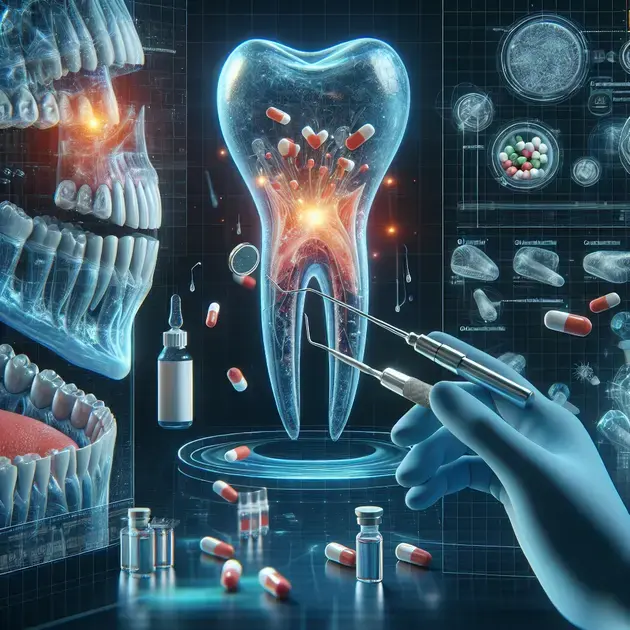Searching for the most effective medication for periodontitis can be overwhelming, considering the wide array of options available in the market today. From traditional antibiotics to advanced surgical procedures, finding the right treatment can be challenging.
However, in this comprehensive guide, we will delve into the most up-to-date and evidence-based strategies for combating periodontitis. Stay tuned to discover the best practices and medications to effectively manage this common dental condition.

Understanding Periodontitis and Its Impact
Periodontitis is a serious gum infection that damages the soft tissue and destroys the bone that supports your teeth. If left untreated, it can lead to tooth loss and other health complications. Understanding the causes and symptoms of periodontitis is crucial for early detection and treatment.
To better understand the impact of periodontitis, you can visit reputable medical websites such as WebMD or Mayo Clinic. These websites provide detailed information on the condition, including risk factors, diagnosis, and treatment options. By educating yourself about periodontitis, you can take proactive steps to prevent and manage the disease.
One effective way to assess the impact of periodontitis is to use the MyPerioPath® test, which analyzes the bacteria in your mouth to determine your risk for developing gum disease. By identifying the specific bacteria present, you can customize your treatment plan for better results.
Regular dental check-ups and cleanings are essential for monitoring the progression of periodontitis and preventing further damage. Your dentist can provide valuable insights into the state of your oral health and recommend appropriate interventions to manage the condition effectively.
Overall, understanding periodontitis and its impact is crucial for maintaining good oral health and overall well-being. By staying informed and proactive, you can protect your smile and prevent the complications associated with gum disease.
Choosing the Right Medication for Periodontitis
When it comes to treating periodontitis, choosing the right medication is essential for managing the infection and promoting oral health. Your dentist may prescribe antibiotics such as doxycycline or minocycline to reduce inflammation and combat the bacteria causing gum disease.
Before starting any medication for periodontitis, it’s important to consult with a healthcare professional to determine the most suitable treatment plan for your individual needs. Your dentist may recommend a combination of antibiotics, mouth rinses, and other oral hygiene products to effectively control the infection.
Online resources such as Drugs.com or RxList provide comprehensive information on various medications used to treat periodontitis. By researching the different options available, you can make an informed decision about which medication is best suited to address your specific condition.
It’s important to follow your dentist’s recommendations closely when taking medication for periodontitis. Be sure to adhere to the prescribed dosage and duration of treatment to maximize the effectiveness of the medication and prevent any potential side effects.
Choosing the right medication for periodontitis is a critical step in managing the infection and preserving your oral health. By working closely with your healthcare provider and staying informed about your treatment options, you can take control of your gum disease and maintain a healthy smile.
Effective Strategies for Managing Periodontitis
Managing periodontitis requires a comprehensive approach that combines professional dental care with good oral hygiene practices at home. In addition to regular dental check-ups and cleanings, there are several strategies you can incorporate into your daily routine to help manage the condition effectively.
One important strategy for managing periodontitis is to practice good oral hygiene, including brushing and flossing regularly to remove plaque and bacteria from your teeth and gums. Using an antibacterial mouthwash can also help reduce the bacteria that cause gum disease.
A healthy diet rich in vitamins and minerals is essential for supporting your immune system and promoting oral health. Consuming foods high in antioxidants, such as fruits and vegetables, can help reduce inflammation and support gum tissue health.
Stress management techniques, such as meditation or yoga, can also play a role in managing periodontitis. Research has shown that stress can weaken the immune system and contribute to the progression of gum disease, so finding ways to relax and unwind can benefit your oral health.
Regular exercise can also have a positive impact on periodontitis management by improving circulation and reducing inflammation throughout the body. Incorporating physical activity into your daily routine can help support your overall health and reduce the risk of complications associated with gum disease.
By implementing these effective strategies for managing periodontitis, you can support your oral health and reduce the impact of gum disease on your overall well-being. Working in tandem with your dental provider, you can develop a personalized treatment plan that addresses your specific needs and helps you maintain a healthy smile for years to come.

Sure! Here is the content for each subheading using HTML tags:
Understanding Periodontitis and Its Impact
Periodontitis is a severe gum infection that damages the soft tissue and destroys the bone that supports your teeth. It can lead to tooth loss if left untreated. This condition is often caused by poor oral hygiene habits that allow plaque to build upon the teeth and harden. The bacteria in plaque produce toxins that irritate the gums, leading to inflammation and infection.
When periodontitis progresses, the gums pull away from the teeth, forming pockets that become infected. As the immune system fights the bacteria, the bone and connective tissue that hold the teeth in place begin to break down. This process can ultimately result in tooth loss and affect your overall oral health.
Effective medication for periodontitis plays a crucial role in managing the condition and preventing further complications. By targeting the bacteria causing the infection and reducing inflammation, these medications help control the progression of periodontitis and support gum health.
Regular dental check-ups and professional cleanings are essential to detect and treat periodontitis in its early stages. Maintaining good oral hygiene practices, such as brushing and flossing regularly, can also help prevent the development of this severe gum disease.
Overall, understanding the causes and impact of periodontitis is key to addressing this condition effectively. By prioritizing oral health and seeking timely treatment, you can minimize the risks associated with periodontitis and maintain a healthy smile.
Key Factors in Periodontitis Medication Selection
When it comes to selecting medication for periodontitis, several key factors must be considered to ensure optimal treatment outcomes. The type and severity of the infection, the patient’s medical history, and any allergies or sensitivities to specific medications play a significant role in determining the most suitable treatment approach.
Antibiotics are commonly prescribed to treat periodontitis, either in pill form or as a topical application. These medications target the bacteria causing the infection and help reduce inflammation in the gums. Depending on the extent of the infection, a combination of antibiotics may be recommended to achieve the best results.
In addition to antibiotics, antimicrobial medications, such as mouth rinses or gels, can be used to control bacterial growth in the mouth and support gum health. These medications are often prescribed as part of a comprehensive treatment plan to address periodontitis effectively.
Anti-inflammatory drugs may also be recommended to reduce swelling and discomfort associated with periodontitis. These medications help manage the symptoms of gum disease and promote healing in the affected areas. It is essential to follow your dentist’s guidelines when taking these medications to ensure their effectiveness.
Overall, the selection of medication for periodontitis should be tailored to the individual patient’s needs and oral health condition. By considering the key factors mentioned above and working closely with your dental healthcare provider, you can optimize treatment outcomes and improve your oral health.
Optimizing Treatment Outcomes Through Medication Management
Medication management is a critical aspect of optimizing treatment outcomes for periodontitis. By following a prescribed medication regimen consistently and accurately, patients can effectively control the progression of the infection and support gum health in the long term.
It is essential to adhere to the recommended dosage and frequency of medication to ensure its effectiveness. Skipping doses or discontinuing treatment prematurely can compromise the results and potentially lead to a recurrence of periodontitis symptoms.
Regular follow-up appointments with your dentist are crucial for monitoring the effectiveness of the medication and adjusting the treatment plan as needed. Your healthcare provider can assess your oral health progress, address any concerns or side effects, and make recommendations to optimize the outcomes of periodontitis treatment.
In addition to medication, maintaining a healthy lifestyle and good oral hygiene practices are essential for managing periodontitis successfully. A balanced diet, regular exercise, and proper oral care routines can all contribute to supporting the effectiveness of medication and promoting overall oral health.
By taking a proactive approach to medication management and incorporating healthy habits into your daily routine, you can enhance the outcomes of treatment for periodontitis and reduce the risk of complications. Working in collaboration with your dental healthcare team, you can achieve optimal oral health and preserve your smile for years to come.
Conclusion
Understanding periodontitis and its impact is crucial for maintaining oral health. This severe gum infection can lead to tooth loss if left untreated, emphasizing the importance of good oral hygiene practices to prevent plaque buildup and bacterial growth. By prioritizing regular dental check-ups and professional cleanings, individuals can detect and treat periodontitis in its early stages, minimizing the risks associated with this condition and preserving a healthy smile.
When selecting medication for periodontitis, considering key factors such as infection type, severity, and patient history is essential for optimal treatment outcomes. Antibiotics, antimicrobial medications, and anti-inflammatory drugs play a significant role in controlling bacterial growth, reducing inflammation, and managing gum disease symptoms. Tailoring medication selection to individual needs in collaboration with dental healthcare providers can help improve oral health and treatment effectiveness.
Optimizing treatment outcomes through medication management involves following prescribed regimens consistently, attending regular follow-up appointments, and maintaining a healthy lifestyle. Adhering to medication dosage and frequency, coupled with healthy habits like proper oral care and a balanced diet, can enhance the effectiveness of treatment for periodontitis. By taking a proactive approach to medication management and working closely with dental professionals, individuals can achieve optimal oral health and long-term success in managing this condition.



